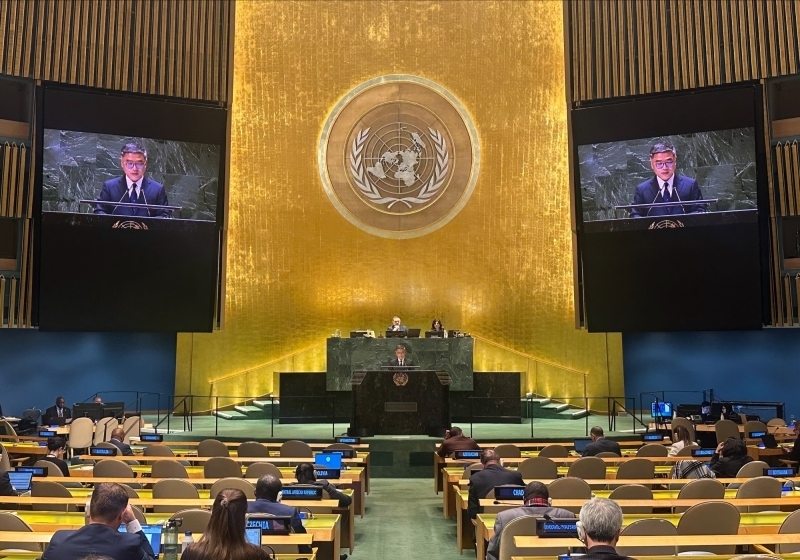Statement by Mr. MIYAMOTO Sogaku, Counsellor, Permanent Mission of Japan to the United Nations, at the Plenary Meeting of the 79th session of the General Assembly on Strengthening of the coordination of humanitarian and disaster relief assistance of the United Nations, including special economic assistance
2024/12/9

Thank you, Mr. President.
Japan is honored to co-sponsor the draft resolutions under Item 72, reaffirming the indispensable role of the United Nations in responding to the world’s increasingly complex and urgent humanitarian challenges.
Mr. President,
We are at critical crossroads. The convergence of conflicts, climate crises, and the erosion of international law has created unprecedented humanitarian needs. With 123 million people forcibly displaced and over 300 million people expected to require urgent humanitarian assistance in 2025, we are reminded of the gravity of the situation and our collective responsibility to respond. From Gaza to Sudan, Ukraine, and beyond, the most vulnerable—especially women and children—bear the brunt of these intersecting crises.
In Gaza, the devastation continues unabated, with tens of thousands of civilian casualties, an appalling death toll among UN personnel and aid workers, and widespread displacement. Only an immediate ceasefire and the immediate release of hostages can end this catastrophe. Japan will continue its tireless diplomatic efforts to achieve these outcomes.
Japan remains gravely concerned about the humanitarian crisis in Ukraine, where Russia’s aggression continues to inflict immense suffering. Deliberate attacks on civilian infrastructure, including energy and water systems, by Russia has left millions vulnerable, especially as winter approaches. Japan strongly demands that Russia withdraw from Ukraine immediately and unconditionally and reaffirms its unwavering support for Ukraine.
Mr. President,
Japan is deeply concerned that humanitarian workers face escalating risks as they deliver life-saving assistance in increasingly dangerous conditions. Tragically, 2024 has become the deadliest year on record for aid workers, with many losing their lives in Gaza, including 251 UNRWA team members, and in other high-risk areas. Recognizing their sacrifices, Japan is committed to enhancing their protection, including strengthening mental health services to support the psychosocial well-being of those on the frontlines.
Mr. President,
Japan’s approach to humanitarian assistance is guided by the principle of human security, which emphasizes the protection and empowerment of individuals. This concept underpins Japan's initiatives that bridge humanitarian response with development and peacebuilding.
Through initiatives like the Multi-Stakeholder Pledge on the Humanitarian-Development-Peace Nexus, launched at last year’s Global Refugee Forum, Japan is advancing refugee self-reliance, alleviating burdens on host countries and fostering stability. We believe that addressing forced displacement requires not just urgent relief, but sustainable solutions that build resilience and reduce dependency.
Tangible progress has already been made. JICA is expanding its HDP Nexus efforts from Uganda and Jordan to additional countries, including Kenya.
Next year, we will leverage major platforms, such as the 9th Tokyo International Conference on African Development (TICAD9) in August and the High-Level Officials Meeting of the Global Refugee Forum in December, to further accelerate this approach.
Japan also welcomes the adoption of the Pact for the Future, which provides a comprehensive vision to address forced and protracted displacement. The Pact strengthens international cooperation and reinforces the imperative to uphold international law, ensuring that no one is left behind.
Mr. President,
In light of growing funding gaps, Japan recognizes the importance of providing high-quality contributions that can adapt to evolving needs. We are committed to designing and implementing more efficient systems of support to ensure that our assistance is responsive and impactful.
Mr. President,
Japan calls on all parties to fully comply with international law, including international humanitarian law, to ensure the protection of civilians, unimpeded humanitarian access, and the safeguarding of civilian infrastructure.
Equally, it is critical to strengthen measures to ensure accountability for violations of international humanitarian law. Persons responsible for serious violations of IHL must be held accountable, and justice under the rule of law must be done. From this perspective, Japan remains committed to supporting the International Criminal Court in its efforts to uphold accountability and provide justice for victims.
Mr. President,
As a longstanding advocate for international cooperation, Japan reaffirms its unwavering commitment to addressing humanitarian challenges. Together, we must respond to the challenges of our time with determination, compassion, and a shared dedication to humanity.
I thank you.
